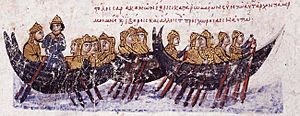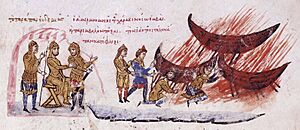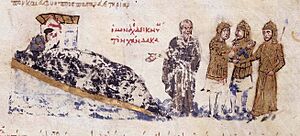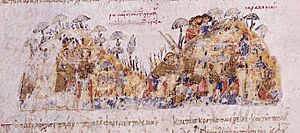Abu Hafs Umar al-Iqritishi facts for kids
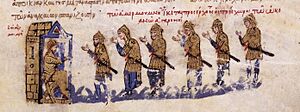
Umar ibn Hafs ibn Shuayb ibn Isa al-Balluti (died around 855 AD), also known as Abu Hafs, was an important leader. He led a group of people from al-Andalus (which is now Spain and Portugal). These people were refugees, meaning they had to leave their homes. They first took control of the city of Alexandria in Egypt. Later, they were forced to leave Alexandria. After that, they sailed to the Byzantine island of Crete and conquered it. Abu Hafs then became the very first Emir of Crete, which means he was its ruler.
Contents
Who Were the Andalusis?
Abu Hafs led a group of people called the Andalusis. They were from al-Andalus, a Muslim-ruled area in what is now Spain. Around the year 818, there was a failed rebellion against the ruler of Córdoba, al-Hakam I. Many people from a suburb of Córdoba were forced to leave their homes.
Some of these exiles went to Fez in Morocco. But a large group, more than 10,000 people, became pirates. They sailed the seas and eventually took over the city of Alexandria in Egypt. They controlled Alexandria for several years.
However, in 827, an army led by the Abbasid general Abdullah ibn Tahir al-Khurasani attacked Alexandria. Abu Hafs and his group were forced to leave the city.
Conquering Crete
After leaving Alexandria, Abu Hafs and his people sailed to the island of Crete. This happened sometime between 824 and 828 AD, during the rule of the Byzantine Emperor Michael II.
Historians believe there were about 12,000 people in Abu Hafs's group, including about 3,000 fighting men. They traveled in 40 ships. Some old stories say that Abu Hafs ordered his ships to be burned after they landed on Crete. This would mean they had no way to go back, so they had to conquer the island. However, since they brought their families with them, it's more likely that this story is just a legend.
The exact place where they landed on Crete is not known for sure. Some think it was on the north coast, perhaps near where their main city, Chandax, was later built. Others believe they landed on the south coast first.
Building a New Home and Fighting the Byzantines
Abu Hafs was in charge of building a new capital city for his people on Crete. This city was called Chandax (which means "Castle of the Moat"). Today, it's known as Heraklion. Moving the capital from the old city of Gortyn helped the Muslims gain stronger control over the island.
Abu Hafs recognized the Abbasid Caliphate (a large Muslim empire) as his overall ruler. However, he acted like an independent prince, making his own decisions for Crete.
The Andalusis also took control of some smaller islands nearby, called the Cyclades. The Byzantine admiral Ooryphas managed to push the Arabs out of these islands, but he couldn't take back Crete.
The Byzantine Emperor Theophilos (who ruled from 829 to 842) tried to work with the ruler of Córdoba to fight Abu Hafs. But this plan didn't work out. In 829, Abu Hafs's fleet destroyed a Byzantine fleet near Thasos. This victory allowed the Andalusis to raid and attack many more islands and coastal areas in the Aegean Sea.
They attacked places like Euboea, Lesbos, and other coastal regions. However, they were defeated in one battle by a Byzantine general named Constantine Kontomytes.
After Emperor Theophilos died in 842, the Byzantines tried again to take back Crete. A powerful leader named Theoktistos led this expedition. They managed to take over much of the island. But Theoktistos had to leave the army because of political problems back in Constantinople. The remaining Byzantine soldiers were then defeated by the Arabs.
Abu Hafs likely died around the year 855. His son, Shu'ayb, became the next ruler of Crete.
| New title | Emir of Crete c. 827 – c. 855 |
Succeeded by Shu'ayb ibn Umar |
See also
 In Spanish: Abu Hafs Umar al-Iqritishi para niños
In Spanish: Abu Hafs Umar al-Iqritishi para niños
 | Dorothy Vaughan |
 | Charles Henry Turner |
 | Hildrus Poindexter |
 | Henry Cecil McBay |


